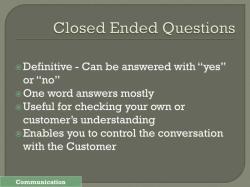How can I start an interesting conversation?
Starting an engaging conversation can be a valuable skill in both personal and professional settings. Here are some practical tips to help you initiate interesting conversations:
Be Observant: Pay attention to your surroundings and the people you're with. Look for cues in their behavior, appearance, or the environment that can serve as conversation starters. For example, you might notice someone wearing a T-shirt with a logo related to your favorite hobby or a book on a nearby table that you've read.
Use Open-Ended Questions: Instead of asking yes/no questions, ask open-ended ones that encourage discussion. For example, instead of asking, "Did you have a good weekend?" you can ask, "What did you do over the weekend?" This allows the other person to share more about their experiences and interests.
Start with Common Ground: Find shared interests or experiences that can serve as a foundation for the conversation. This could be a mutual acquaintance, a recent news event, a shared hobby, or a common experience like attending the same event.
Compliments and Praise: Offering a genuine compliment or praising someone's achievements or choices can be a great way to break the ice. People usually enjoy talking about things they're proud of.
Ask About Their Passions: People love talking about their passions and interests. Ask them about their hobbies, favorite books, movies, or travel experiences. When someone discusses something they're passionate about, it often leads to an engaging conversation.
Listen Actively: Being a good listener is just as important as being a good conversationalist. Show genuine interest in what the other person is saying. Nod, maintain eye contact, and ask follow-up questions to demonstrate your engagement in the conversation.
Share Personal Stories: Sharing anecdotes or personal stories can make the conversation more relatable and interesting. However, be mindful not to dominate the conversation with your own stories; ensure it remains a two-way exchange.
Stay Informed: Keeping up with current events, trends, and general knowledge can provide you with a wide range of topics to discuss. Being well-informed makes you a more interesting conversationalist.
Use Humor Wisely: Appropriate humor can lighten the mood and make a conversation more engaging. However, be careful not to use humor that may offend or make others uncomfortable.
Body Language: Your body language plays a crucial role in how engaging your conversation is. Maintain good posture, make eye contact, and use gestures to express yourself. This can convey confidence and interest.
Avoid Controversial Topics: While it's essential to discuss a variety of subjects, be cautious about bringing up highly controversial or sensitive topics initially. Gauge the other person's comfort level and preferences before delving into such discussions.
Follow Up: If the conversation naturally leads to a specific topic or question, follow up on it. Don't hesitate to explore interesting threads in the conversation.
Practice Active Empathy: Try to understand the other person's perspective and emotions. Show empathy and compassion in your responses, which can lead to more meaningful and engaging conversations.
Remember that practice makes perfect. The more you initiate and participate in conversations, the better you'll become at sparking engaging discussions. Additionally, be authentic and genuine in your interactions, as people are more likely to be drawn to those who are sincere and interested in them.
Crafting an Interesting Conversation: Tips and Tricks
- Be genuinely interested in the other person. People can tell when you're faking it, so it's important to be genuinely curious about their lives and experiences. Ask open-ended questions and listen carefully to their answers.
- Find common ground. This doesn't mean you have to have everything in common with the other person, but it helps to find some shared interests that you can talk about. This could be anything from sports and hobbies to work and current events.
- Be positive and enthusiastic. People are drawn to those who have a positive attitude. Smile, make eye contact, and show that you're enjoying the conversation.
- Be a good listener. Don't just wait for your turn to talk. Pay attention to what the other person is saying and ask follow-up questions.
- Be yourself. Don't try to be someone you're not. People can appreciate authenticity.
The Art of Engaging Dialogue: How to Start an Interesting Conversation
- Ask open-ended questions. Avoid yes/no questions and instead ask questions that require the other person to elaborate. For example, instead of asking "Do you like your job?", ask "What do you like most about your job?"
- Be specific. Instead of asking "What did you do on your vacation?", ask "What was your favorite part about your trip to Hawaii?"
- Follow up on their answers. Ask follow-up questions to show that you're interested in what they have to say. This also helps to keep the conversation flowing.
- Share your own experiences. Don't just ask questions; share your own thoughts and experiences as well. This helps to create a two-way conversation.
- Be mindful of your body language. Make eye contact, smile, and lean in slightly to show that you're engaged in the conversation.
Captivating Chats: Strategies for Launching Fascinating Discussions
- Start with a strong opening. A good opening line can grab the other person's attention and make them want to talk to you more. You could start with a question, a compliment, or an interesting observation.
- Be unpredictable. Don't be afraid to talk about different and unusual topics. This can help to make your conversations more interesting and memorable.
- Be a storyteller. People love stories, so try to incorporate them into your conversations. This could be a personal story, a story you heard from someone else, or even a fictional story.
- Use humor. A good sense of humor can make your conversations more enjoyable and engaging. Just be sure to avoid offensive or inappropriate jokes.
- Be respectful. Even if you disagree with someone, it's important to be respectful of their opinions. Avoid arguing or getting into heated debates.
Here are some additional tips for starting an interesting conversation:
- Comment on the environment or surroundings. This could be anything from the weather to the décor of the room.
- Ask for information. People love to help others, so asking for information is a great way to start a conversation. For example, you could ask for directions, recommendations, or advice.
- Compliment the other person. Everyone loves to receive compliments, so be sure to give a few out if you're genuinely impressed with something about the other person.
- Share a common experience. If you notice that you have something in common with the other person, such as a shared hobby or interest, bring it up. This is a great way to start a conversation about something that you both know about.
- Be playful and fun-loving. Don't be afraid to be yourself and let your personality shine through. People are drawn to those who are positive and fun to be around.
With a little practice, you can learn to start and maintain interesting conversations with anyone. Just remember to be genuine, interested, and respectful.













